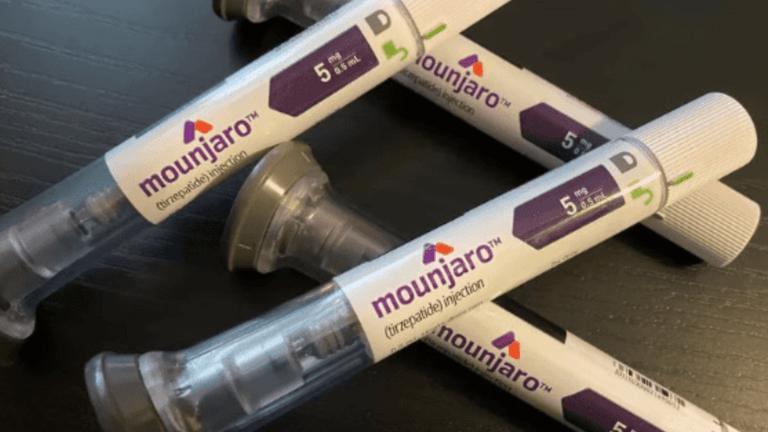The Effectiveness and Cost of Natural Products Compared to Mounjaro’s and others like Ozempic, Semaglutide, Wegovy, and Zepound

(Video Credit Above) Today. (2024). Weight-loss Drugs, United States. https://youtu.be/IgXgdNBtKmo
Think About this…..
Do you believe insurance companies want to help prevent chronic diseases like diabetes and heart disease if they are not prescribing medication for obesity, which contributes to type 2 diabetes and heart disease?
Why not make an injection that will include all the natural ingredients to make it more affordable?
Companies that make Mounjaro, Ozempic, Wegovy, and other Semiglutides are making millions using natural producted mixed in with thier ingredients.
Should insurance companies be responsible for paying the hefty tag for preventative obesity?
Wait to answer the question after you read this.

- Obesity has reached epidemic proportions globally, with at least 2.8 million people dying each year as a result of being overweight or obese (WHO, 2021).
- In the US, 32% of white and 53% of black women are obese (Dodgen and Spence-Almaguer, 2017).
- Obesity is the leading risk factor for type 2 diabetes (T2D) and cardiovascular disease (CVD) (Bhupathiraju and Hu, 2016). Insurance companies are not approving it —

Mounjaro: Although
FDA-approved for type 2 diabetes treatment, its use for weight loss is not yet
approved. As a result, most insurance companies do not cover Mounjaro for
weight loss purposes, citing a lack of FDA approval for this indication.

Wegovy: FDA-approved for weight loss, Wegovy is covered by some
insurance plans. However, this approval is specific to its indication for
weight loss, and coverage may vary depending on the insurance provider.
![]()
Prior Authorization: Even when insurance companies do cover Wegovy, prior
authorization (PA) requirements may apply. Healthcare providers must submit a
form to the insurance company to seek approval for Wegovy, which can be
time-consuming and bureaucratic.

Off-label prescribing: Some healthcare providers may be reluctant to prescribe
Mounjaro off-label for weight loss due to insurance company pressure to
prescribe lower-cost drugs. This can lead to a lack of access to Mounjaro,
Wegovy, and Ozempic for patients who could benefit from it for weight loss.

Type 2 diabetes
coverage: Insurance companies may cover Mounjaro for
type 2 diabetes treatment but not for weight loss. Patients with type 2
diabetes may have access to Mounjaro, while those using it solely for weight
loss may face denial.
(Video Credit Above) Goldstein, J. MD., ELSEVIER (2024). Diabetes and Obesity, United States. https://www.youtube.com/watch?v=ip5xSZ5eXdE
(Video Credit Above) Heald Diabetes (2024). Diabetes and Heart Disease, United States https://www.youtube.com/watch?v=9qa9VIWpoQE
Bhupathiraju and Hu (2016) indicate that obesity and diabetes significantly raise the risk of cardiovascular disease (CVD) and stroke. Klein et al. (2022), Scherer and Hill (2016), American Diabetes Association (n.d.), The risk of type 2 diabetes increases linearly with an increase in individuals with excessive weight gain BMI. Yes, insurance companies will not use preventative medication for weight gain. Fat cells are more insulin-resistant than muscle cells, exacerbating insulin resistance. Sudden, unexplained weight loss can be a symptom of undiagnosed diabetes, as the body burns fat and muscle instead of glucose due to insulin resistance. Therefore, recognizing excessive weight as a critical factor in developing type 2 diabetes is essential for preventative measures.
Mounjaro a prescription drug, gained popularity for promoting weight loss and improving
blood sugar control in people with type 2 diabetes. Still, its use has
potential side effects and a hefty price tag. As an alternative, natural weight
loss compounds have emerged as viable for those seeking a more holistic
approach. By investigating and assessing the differences between Mounjaro and natural weight loss compounds, highlighting their mechanisms of action,
benefits, and potential drawbacks.
Specifically, it is hypothesized that natural weight loss compounds that are derived from plants, herbs, and other natural sources are sustainable at suppressing appetite, increasing metabolism, providing antioxidant and anti-inflammatory properties, combating chronic diseases, reducing inflammation, improving cardiovascular health, reducing stress, strengthen muscle mass, and boosting overall weight loss circumferences compared to Mounjaro.
(Video Credit Above) SciSho (2024). Diabetes and Heart Disease, United States. https://youtu.be/1nsY3rLl1gs
Medication Comes from Plants, Herbs, and other Natural Resources
 Pavid (2021), Veeresham (2012), and Chaachouay and Zidane (2024) affirm that prescription medicines derived from plants, herbs, flowers, and other natural resources have a rich history and play a significant role in modern healthcare. Nasim, Sandeep, and Mohanty (2022) urge that balancing traditional knowledge with scientific rigor ensures plant-based medicines’ safe and effective development to benefit patients worldwide.
Pavid (2021), Veeresham (2012), and Chaachouay and Zidane (2024) affirm that prescription medicines derived from plants, herbs, flowers, and other natural resources have a rich history and play a significant role in modern healthcare. Nasim, Sandeep, and Mohanty (2022) urge that balancing traditional knowledge with scientific rigor ensures plant-based medicines’ safe and effective development to benefit patients worldwide.
- Aspirin: Derived from salicin, a compound found in the bark of the white willow tree (Salix alba) and the leaves of the meadowsweet plant (Filipendula ulmaria).
- Taxol (Paclitaxel): Isolated from the bark of the Pacific yew tree (Taxus brevifolia), used to treat ovarian and breast cancers.
- Vincristine and Vinblastine: Derived from the Madagascar periwinkle (Catharanthus roseus), used to treat various types of cancer, including leukemia and lymphoma.
- Quinine: Extracted from the cinchona tree (Cinchona calisaya), used to treat malaria.
- Digoxin: Derived from the foxglove plant (Digitalis purpurea), used to treat heart conditions such as atrial fibrillation and congestive heart failure.
- Colchicine: Isolated from the autumn crocus plant (Colchicum autumnale), used to treat gout and other inflammatory conditions.
- Morphine: Derived from the opium poppy plant (Papaver somniferum), used to treat pain and coughs.
- Rauvolfia: Extracted from the Rauvolfia serpentina plant, used to treat hypertension and anxiety disorders.
- Glycyrrhizin: Derived from the licorice root (Glycyrrhiza glabra), used to treat various conditions, including peptic ulcers and bronchitis.
- Curcumin: Isolated from turmeric (Curcuma longa), used to treat conditions such as arthritis, depression, and Alzheimer’s.
While plant-based medicines offer many benefits, including reduced toxicity and improved efficacy, there are challenges to their development and regulation. These include:
Standardization: Ensuring consistent quality and potency of plant extracts.
Bioavailability: Improving the absorption and effectiveness of plant-derived compounds.
Regulatory frameworks: Establish clear guidelines for developing and marketing plant-based medicines.

Natural Compounds: Oregano, Yerba Mate, green coffee bean extract, Berbamine (dihydrochloride)and Berbamine (bisbenzylisoquinoline)are the same compound, Berberine, Resveratrol, and Alpha-lipoic acid, Fenugreek, Caralluma Fimbriata, Gymnema Sylvestre, cumin (black seed oil), Cardamom, cayenne pepper, ginger, oregano, Gynostemma/Jiaogulan, L-carnitine, cinnamon, Vitamin E, Alpha-lipoic acid, Vitamin C, Chlorogenic acid, Lycopene, Fucoxanthin, and Glucomannan for weight loss.
Mounjaro: A Prescription Medication
Puckey and BPharm (2024) affirm that Mounjaro, also known as tirzepatide, is a glucagon-like peptide-1 (GLP-1) receptor agonist that stimulates insulin release and slows gastric emptying, leading to appetite suppression and weight loss. While it has shown remarkable efficacy in clinical trials, Mounjaro’s use is linked to potential side effects, such as pancreatitis, gall bladder problems, and increased risk of thyroid cancer.
![]()
Natural weight loss compounds, though, are derived from plants, herbs, and other natural sources. These compounds work by Oregano, Yerba Mate, green coffee bean extract, Berbamine (dihydrochloride), and Berbamine (bisbenzylisoquinoline)are the same compound, Berberine, Resveratrol, and Alpha-lipoic acid, Fenugreek, Caralluma Fimbriata, Gymnema Sylvestre, cumin (black seed oil), Cardamom, cayenne pepper, ginger, oregano, Gynostemma/Jiaogulan, L-carnitine, cinnamon, Vitamin E, Alpha-lipoic acid, Vitamin C, Chlorogenic acid, Lycopene, Fucoxanthin, and Glucomannan for weight loss compared to Mounjaro.

Natural Compounds
The natural compounds suppress appetite by activating neurotransmitters like serotonin and dopamine. Enhancing fat burning and increasing thermogenesis. Reducing carbohydrate absorption and improving insulin sensitivity. Some popular natural weight loss compounds include Berberine, a plant alkaloid found in Berberis species, which improves insulin sensitivity and reduces body weight. Green tea extract, rich in catechins, is linked to enhanced fat oxidation and weight loss. Conjugated linoleic acid (CLA), a fatty acid found in dairy and meat products, has been studied for its potential to reduce body fat and improve insulin sensitivity.While Mounjaro has shown significant effectiveness in clinical trials, its use is limited by potential side effects and high cost.
It is essential to note that individual results may vary, and more research is needed to fully understand the long-term effects and optimal dosage of natural weight loss compounds.
In the following sections, we will delve deeper into the specific natural weight loss compounds, explore their mechanisms of action, benefits, and potential drawbacks, and compare them to Mounjaro regarding effectiveness and safety.

Fang et al. (2023) and Kapoor et al. (2024) indicate that Glucomannan is a water-soluble dietary fiber extracted from the roots of the konjac plant (Amorphophallus konjac). Glucomannan has been used as a food additive, dietary supplement, and traditional medicine for centuries. Glucomannan contributes to weight loss, increasing feelings of fullness, blood sugar control by regulating blood sugar levels by slowing down the absorption of glucose, cholesterol reduction to lower LDL cholesterol levels by inhibiting cholesterol absorption in the gut for prebiotics and providing constipation relief, promoting regular bowel movements, relieving constipation. Glucomannan may contribute to weight loss by suppressing appetite, slowing digestion and absorption, promoting prebiotic effects, and regulating bowel movements. However, more research is needed to understand its mechanisms and fully understand optimal dosages for weight management.

Imran et al. (2023) and Kim et al. (2013) assert that oregano may improve insulin sensitivity and reduce inflammation. Research suggests that oregano oil supplementation (100 mg/day) improved insulin sensitivity and reduced body fat rate in obese people. Contains carvacrol and thymol, compounds with anti-inflammatory and antioxidant activities. In addition, it reduces inflammation and oxidative stress in the body, potentially protecting against chronic diseases like heart disease and cancer. Oregano has also been traditionally used to treat digestive problems and respiratory infections. Similarly, Cheng et al. (2017) suggest that oregano oil improves meat quality, fatty acid composition, and oxidative stability of the Longissimus thoracic muscle. Therefore, these benefits may be attributed to the antioxidant and anti-inflammatory properties that can improve meat quality and reduce oxidative damage. While the exact mechanisms behind oregano’s benefits are not fully understood, it is thought that the herb’s anti-inflammatory and antioxidant properties may play a role in improving insulin sensitivity and reducing inflammation.

Kumarasinghe and Gunathilaka (2024), Mumu et al. (2022), and Ahmed et al. (2022) affirm that fucoxanthin is a unique carotenoid with an allenic bond in its structure that can be used for weight loss, inflammation, treatment for diabetes, cancer and promotes energy. It is extracted from various algae and edible seaweeds. It has been proven to contain numerous health benefits and preventive effects against diseases like diabetes, obesity, liver cirrhosis, and cancer. Essentially, fucoxanthin has antibacterial, antifungal, Antioxidant, Anti-inflammatory, and Skin protective, improving skin health; Anti-obesity, reducing body fat and weight loss; Antidiabetic, reducing glucose and insulin; and Hepatoprotective in protecting the liver. Fucoxanthin can be used with bioavailability through encapsulation, complexation, and formulation. Therefore, fucoxanthin’s structure is thought to contribute to its distinct biological activities and potential therapeutic benefits. The existing evidence suggests that it is a promising carotenoid with a broad range of health benefits.

Yerba Mate (Ilex paraguariensis) and Green Coffee Bean Extract (GCB) share similarities in their chemical makeup and potential health benefits. Mesas et al. (2011), Revuelta-Iniesta and Al-Dujaili (2014) suggest that GCE supplementation may be a beneficial adjunctive therapy for hypertensive individuals, as it improves blood pressure and lipid profiles without significant adverse effects, explicitly reducing weight.

Colpo et al. (2016), Lunceford and Gugliucci (2005), and Gorji et al. (2019) both contain antioxidants, including chlorogenic acids, which may contribute to their therapeutic effects, preventing aged formation, protecting free radicals, safe adjunctive therapy for weight loss in obese adults, reduces BMI in adults with obesity.

Sudeep et al. (2016), Li et al. (2009), Liu et al. (2023), Sudeep and Prasad (2021), and Rocha et al. (2018) indicate that both Yerba Mate and Green Coffee Bean Extract have shown potential health benefits, including antioxidant and anti-inflammatory activities, weight loss and metabolism support, cardiovascular health improvements, and neuroprotection. Areta et al. (2018) and
Krolikowski et al. (2022) indicate that combining these extracts may have synergistic effects. Still, more human clinical trials, diet, and exercise are necessary to confirm their efficacy and safety; Menini et al. (2007) The yerba mate is an antioxidant and has cardiac protection properties. The protective action of Ilex paraguariensis extract against free radical inactivation of PON-1 in HDL may contribute to its potential benefits in preventing atherosclerosis and cardiovascular disease. The extracts contain a rich mixture of polyphenols, including chlorogenic acid, caffeic acid, and quinic acid, responsible for their antioxidant and anti-inflammatory activities. Therefore, the protective action of Ilex paraguariensis extract against free radical inactivation of PON-1 in HDL highlights its potential as a natural therapeutic agent for preventing and treating cardiovascular disease.
- Antioxidant and Anti-Inflammatory Properties: Yerba Mate and green coffee bean extract (GCB) extracts have been shown to exhibit antioxidant and anti-inflammatory activities, which may help protect against oxidative stress and inflammation-related diseases.
- Weight Loss and Metabolism: GCB has been studied for its potential role in weight loss, mainly due to the chlorogenic acid content, which may inhibit carbohydrate absorption and enhance fat metabolism. Although not as extensively researched, Yerba Mate may contribute to weight loss through its caffeine and chlorogenic acid content.
- Cardiovascular Health: Yerba Mate and GCB extracts have been linked to improvements in cardiovascular risk factors, such as blood pressure and cholesterol levels.
- Neuroprotection: Yerba Mate has been studied for its potential neuroprotective effects, including antioxidant and anti-inflammatory activities that may help mitigate neurodegenerative diseases.
- Combination Effects: The combination of Yerba Mate and GCB extracts may have synergistic effects, potentially enhancing their benefits. For example, a study found that a mixture of Yerba Mate and GCB extracts improved glucose metabolism and insulin sensitivity in obese people.

Talenezhad (2020) showed that l-carnitine improves insulin sensitivity, improves fat metabolism, and reduces body fat. It primarily promotes weight loss and improves body composition, as measured by body weight, BMI, and fat mass decreases. However, the evidence suggests that L-carnitine supplementation does not significantly affect waist circumference (WC) and body fat percentage (BFP). However, Alipoor et al. (2014) found that L-carnitine reduced BMI and waist circumference supplementation reduced waist circumference from 97.68 ± 9.25 cm to 90.56 ± 8.91 cm. In addition, reduced hip circumference from 118.06 ± 8.2 cm to 111.86 ± 8.32 cm., and reduced body fat from 41.12 ± 1.86% to 36.51 ± 1.65% in obese individuals.
L-carnitine supplementation has been found to have a positive effect on metabolic status in obese diabetic women with a hypocaloric diet. The supplement has been shown to reduce fasting blood glucose, triglycerides, cholesterol, LDL-C levels, and insulin resistance. Therefore, Talenezhad et al.’s (2020) findings suggest that l-carnitine supplementation can be a valuable adjunctive therapy for individuals seeking to improve their insulin sensitivity, body composition, and weight management.
Combat Chronic Diseases

Wang et al. (2016) strongly urge that berbamine (dihydrochloride), a compound isolated from barberry, be identified as an anti-adipogenic agent through a high-content imaging assay. Berbamine (dihydrochloride) reduces LD formation by over 50% and exhibits dose-dependent effects. The IC50 values of berbamine (dihydrochloride) were 0.95. Additionally, berbamine (dihydrochloride) did not exhibit hepatotoxicity within 40 μM, making it a potential therapeutic candidate. Therefore, Berbamine (dihydrochloride) may be a potential therapeutic candidate for disorders associated with increased LD buildup, such as obesity and metabolic syndrome. Liu et al. (2022) assert that it has been found to inhibit the progression of colorectal cancer (CRC) by targeting the receptor tyrosine kinases (RTKs)/Akt axis, which play a crucial role in metabolism, leading to weight loss.
Therefore, the evidence indicates that berbamine may potentially prevent and reduce fat accumulation, a critical factor in metabolic dysfunction.
- Chemical Structure: Berbamine is a natural (bisbenzylisoquinoline) alkaloid containing two benzylisoquinoline groups.
- (dihydrochloride) Form: Berbamine (dihydrochloride) is the compound’s (dihydrochloride) form, meaning it has two hydrochloride groups attached to it.
- Same Compound: Despite the different names, Berbamine (dihydrochloride)and Berbamine (bisbenzylisoquinoline)refer to the same compound with the same chemical structure and properties.
Appetite Suppression
Fenugreek, Gymnema Sylvestre, and Caralluma Fimbriata are three natural herbs that positively affect appetite regulation. Specifically, they have been shown to reduce hunger and increase feelings of fullness. On the contrary, Jayawardena et al. (2021) indicate that C. fimbriata supplementation may not effectively mitigate appetite or promote weight loss.

Turner et al. (2022) suggest that while Gymnema Sylvestre may have some potential benefits for blood glucose control and inflammation reduction, the available evidence does not indicate that it is an effective agent for weight loss beyond six months. Additionally, Albaker (2023) asserts that fenugreek extracts positively reduced body fat, increased lean body mass, improved muscle strength and endurance, and accelerated the rate of glycogen resynthesis during post-exercise recovery.

On the contrary, Jeevana, Kalpana, and Sirisha (2023), Furman et al. (2020), and Dinda et al. (2022) affirm that phytochemicals, such as alkaloids and saponins, are responsible for these medicinal plants’ anti-obesity activities. For example, the khellactone derivatives and phenols of Phlojodicarpus sibiricus (Apiaceae) have been found to inhibit adipogenesis and improve lipid metabolism. Taraxacum officinale, a common dandelion species, has been shown to show anti-obesity effects through its metabolite profile and molecular docking ideas. Therefore, phytomedicines have shown promising results in clinical trials for managing obesity and diabetes with Aloe vera, Psyllium fiber, Fenugreek seeds, Nigella sativa seeds, and Jinqi Jiangtang, reducing HbA1c levels and FPG. Therefore, medicinal plants have shown promise in treating obesity, with various plant chemicals and mechanisms contributing to their anti-obesity effects.
Pezzino et al. (2024) highlights the importance of modulation of the intestinal microbiome, anti-adipogenesis properties, and oxidative stress/inflammation reduction in combined therapies, targeted delivery systems, and personalized medicine approaches. For this reason, preliminary findings suggest that Fenugreek, Gymnema Sylvestre, and Caralluma Fimbriata may be valuable additions to a comprehensive weight management strategy. These natural herbs offer a promising alternative or adjunct to conventional weight loss approaches, and further research is needed to understand their mechanisms and efficacy fully.

Morovati et al. (2019) suggest that cumin black seed improves insulin sensitivity, reduces inflammation, and improves fat metabolism as a helpful adjunct therapy for improving metabolic profile and reducing serum leptin levels in prediabetic subjects. On the contrary, Jafari et al. (2018) state that cumin supplementation did not significantly alter anthropometric indices, glycemic control, blood pressure, lipid profiles, or insulin resistance compared to the placebo group. In contrast, Taghizadeh et al. (2015) and Ma and Mu (2015) confirm that taking cumin cyminum L. for 8 weeks among overweight subjects had beneficial effects on weight loss, metabolic profiles, and biomarkers of oxidative stress. Therefore, these conflicting findings suggest that the effects of cumin on insulin sensitivity and metabolism may be complex and dependent on various factors, such as the population being studied and the specific health outcomes being measured.

- Fenugreek: The soluble fiber in fenugreek can boost metabolism, increase thermogenesis, improve calorie burning, and help in weight loss. Fenugreek may also help reduce hunger and increase feelings of fullness.
- Gymnema Sylvestre: Gymnema Sylvestre contains gymnemic acid, which can help reduce the perceived sweetness of foods, preventing sugar cravings. It may also help reduce appetite and increase feelings of fullness.

Antioxidant Effects: Resveratrol, Alpha-lipoic acid, and Berberine have antioxidant properties, which may help protect against oxidative stress and promote weight loss.
Inflammation Reduction
Cardamom may aid digestion, reduce appetite, and improve metabolism. A study found that cardamom extract reduced body mass index (BMI) and waist circumference in obese people. Cheethirala (2016) and Payab (2020) indicate that curcumin, flavonoids, and polyphenols have improved lipid profiles, glucose metabolism, and cardiovascular health. Therefore, the evidence from the systematic review and meta-analysis found that herbal medicines are generally safe and well-tolerated. Herbal medicines can be a valuable supplement to conventional treatments for obesity and metabolic syndrome.
Dinda et al. (2022) confirm that berberine, resveratrol, and valoneic acid dilactone have shown anti-diabetic effects. Hidalgo-Lozada (2024) highlights the potential of natural compounds and phytochemicals in preventing and treating obesity. Ashraf et al. (2024) suggest that lifestyle-associated oxidative stress, fueled by factors such as pollution, poor diet, and lack of exercise, has significantly contributed to various chronic diseases. Phytochemical antioxidants from medicinal plants, especially those adapted to high-altitude environments, have emerged as a promising approach to mitigate oxidative stress-induced disorders to fight chronic diseases (e.g.,) cardiovascular disease, diabetes, neurodegenerative disorders, and cancer) It is a natural remedy to unlock the full potential of these natural compounds and integrate them into evidence-based antioxidant, analgesic, and anti-inflammatory activities, potent antioxidant properties, scavenging free radicals, and reducing oxidative stress. This demonstrates anti-inflammatory effects, inhibiting pro-inflammatory transcription factors and reducing inflammation-mediated tissue damage. Resveratrol can modulate epigenetic pathways, influencing gene expression and cellular responses to oxidative stress for improved therapeutic strategies.

Gynostemma/Jiaogulan improves insulin sensitivity, reduces inflammation, and enhances fat metabolism. Lee et al. (2019) strongly urge that gynostemma effectively relieves fat diet-induced obesity in C57BL/6N mice by regulating SIRT1 (silent information regulator 1), an essential metabolism and energy homeostasis regulator. A study found Gynostemma extract for 8 weeks reduced BMI and waist circumference in obese individuals. Gynostemma/Jiaogulan’s comprehensive benefits on insulin sensitivity, inflammation, and fat metabolism make it a promising herbal remedy for preventing and treating metabolic disorders. Further research is needed to elucidate its mechanisms and optimal dosing regimens fully. Still, the evidence suggests this traditional Chinese herb may be a valuable adjunctive therapy for improving metabolic health.

Fella et al. (2020) suggest combining cinnamon and quercetin; enhanced antioxidant and anti-inflammatory effects and neuroprotective benefits may improve their potential benefits. In addition, Prakash and Kumar (2011), Pezzino et al. (2024), and Abdali et al. (2015) argue that natural compounds have their own unique properties and potential benefits. For instance, vitamin E and alpha-lipoic acid are antioxidants with anti-inflammatory effects, while vitamin C is essential for immune function and collagen production.

Chlorogenic acid has been linked to blood glucose regulation and antioxidant activities, lycopene has anticancer and cardiovascular benefits, and fucoxanthin has anti-obesity and antioxidant properties. Most importantly, antioxidant supplements, including a balanced diet and regular exercise, should not replace a healthy lifestyle. However, natural antioxidants protect the body against oxidative stress and related diseases. The effectiveness of antioxidant supplements may vary depending on the individual, the specific supplement, and the dosage. Therefore, antioxidant and anti-inflammatory compounds have reduced the risk of heart disease, anti-inflammatory effects, reduced cancer and tumor growth, improved joint health, skin and eye health, and neuroprotection.
Natural Compounds Comparison with Mounjaro
Mounjaro works by inhibiting the SGLT2 receptor, reducing glucose reabsorption in the kidneys, and increasing glucose excretion in the urine. While it is effective for weight loss, its action mechanism differs from the natural compounds listed above.

Key Differences
- Targeted Action: Mounjaro specifically targets glucose metabolism, whereas the natural compounds have a broader range of mechanisms, including metabolic boost, appetite suppression, and anti-inflammatory effects. While Mounjaro focuses primarily on glucose metabolism, natural compounds exhibit a more comprehensive range of effects, influencing multiple pathways to promote metabolic health, weight management, and overall well-being.
- Side Effect Profile: Mounjaro has a risk of adverse events, including genital yeast infections, increased urination, and dehydration. The natural compounds generally have a more favorable side effect profile, although individual tolerance and interactions may vary. Mounjaro carries a risk of genital yeast infections, increased urination, and dehydration as adverse events. Although individual variability is possible, natural compounds tend to have a more favorable side effect profile. Patients should discuss potential side effects with their healthcare provider and monitor their condition closely during treatment.
- Dosing and Convenience: Mounjaro requires a prescription and is taken as an injection. The natural compounds can be consumed as an injection if resources become available for fast-acting treatment, in addition to being taken as a dietary supplement, tea, or extracts, offering more flexibility and convenience. Most importantly, the natural compounds and resources are widely available in supplement form, while Mounjaro’s availability is limited due to patent restrictions and high demand. The cost for natural supplements is generally more affordable than Mounjaro, which requires a prescription and may have higher out-of-pocket costs.
(Video Credit Above) Routledge (2024). Diabetes and Heart Disease, United States. https://youtu.be/1nsY3rLl1gs
- Here you can search for the “Dictionary of Natural Products.“
Combining Antioxidants and Anti-Inflammatory Compounds
Abdali, Samson, and Grover (2015) indicate that While antioxidant supplements may have some benefits in treating obesity and diabetes, they should not be relied upon as the sole treatment. A healthy lifestyle, including a balanced diet and regular exercise, is still essential for managing these conditions.
Some commonalities among these herbal extracts include:
- Antioxidant properties: Many of these extracts, such as Berberine, Resveratrol, and Alpha-lipoic acid, have potent antioxidant effects, which can help protect against cell damage and inflammation.

- Anti-inflammatory properties: Extracts like Ginger, Turmeric (not mentioned, but related to Ginger), and Cayenne pepper have anti-inflammatory compounds that may help reduce pain and inflammation.

- Metabolic benefits: Some extracts, such as Green Coffee Bean Extract and Berberine, may aid in weight management and glucose regulation.
Each extract has its unique characteristics and potential benefits:
- Yerba Mate, for example, is rich in caffeine and has been used as a stimulant and energy booster.
- Oregano is a compound with antimicrobial and antifungal properties that contains carvacrol.
- Gynostemma/Jiaogulan has been used in traditional Chinese medicine to promote cardiovascular health and reduce stress.
- Gymnema Sylvestre: An herb used in Ayurvedic medicine, Gymnema Sylvestre has been shown to reduce blood sugar levels and improve insulin sensitivity.
- Fenugreek and Gymnema Sylvestre have been used to support blood glucose control and insulin sensitivity. Traditionally used to manage blood sugar levels, Fenugreek contains fiber, antioxidants, and saponins, which may help regulate insulin and glucose metabolism.
Based on the provided list of natural compounds, it is possible to identify many compounds with distinct properties and potential benefits. While Oregano, Yerba Mate, green coffee bean extract, and Berbamine (dihydrochloride), Berberine (bisbenzylisoquinoline) are not the same compound (Berberine is a distinct alkaloid found in Berberis species), we can group the remaining ingredients into categories:
Resveratrol: Found in grapes, berries, and peanuts, Resveratrol has been studied for its potential anti-inflammatory and antioxidant properties.
Alpha-lipoic acid: A naturally occurring compound in plants and animals, Alpha-lipoic acid has antioxidant and anti-inflammatory effects.
Ginger: Contains gingerols and shogaols, which have anti-inflammatory and antioxidant properties.
Blood Sugar and Insulin Regulation
Metabolic and Energy-Boosting Compounds
Green Coffee Bean Extract: Contains chlorogenic acid, which may slow down glucose absorption and enhance fat burning.
L-carnitine: An amino acid involved in fatty acid transport and energy production.
Digestive and Anti-Inflammatory Herbs
Cardamom: Traditionally used to aid digestion, Cardamom contains compounds with anti-inflammatory and antioxidant properties.

Cumin (Black Seed Oil): Rich in antioxidants and polyphenols, Cumin oil may have anti-inflammatory and digestive benefits.

Gynostemma/Jiaogulan: An herb used in traditional Chinese medicine, Gynostemma/Jiaogulan has been studied for its potential anti-inflammatory and antioxidant effects.
Other Compounds

Berberine: An alkaloid with antimicrobial and anti-inflammatory properties, Berberine is found in Berberis species.

Oregano: Contains carvacrol and thymol, which have antimicrobial and antioxidant properties.
Conclusion
While Mounjaro is a prescription drug with a proven track record for weight loss, the natural compounds listed above offer a comprehensive approach with distinct mechanisms of action. People considering weight loss supplements may find the natural compounds attractive because of their potential for broader benefits, fewer side effects, and greater convenience. However, consulting with a health professional before adding supplements to your program is essential, especially if you have primary health conditions or take medications. Mounjaro mainly targets the brain’s appetite centers, reducing hunger and increasing satiety. While it may be effective for weight loss, its effects may be more pronounced in the short term, and long-term adherence to treatment may be challenging.
Ultimately, choosing between natural weight loss and Mounjaro compounds depends on individual patient needs and preferences. Natural compounds like berberine and green tea extract may be preferred for patients seeking a more gentle, non-invasive approach with fewer potential side effects. In comparison, Mounjaro may be suitable for patients with type 2 diabetes seeking comprehensive weight loss and glucose control treatment.
Natural compounds’ mechanism of action may be more complex and multifaceted than Mounjaro weight loss compounds, which often target specific pathways. Therefore, natural compounds’ multiple receptor agonisms may contribute to their superiority to weight loss efficacy and decrease the risk of side effects compared to Mounjaro. Most importantly, while natural compounds may sound less effective for weight loss due to a lack of research evaluation, they may be better tolerated and have fewer interactions with medications.
While some of these compounds may have synergistic effects, it is essential to note that individual results may vary, and more research is needed to understand their interactions and potential benefits fully. Therefore, more research is required to test and re-test the effectiveness of natural compounds compared to prescriptions like Mounjaro.
Now ask yourself…..
Do you believe insurance companies want to help prevent chronic diseases like diabetes and heart disease if they are not prescribing medication for obesity, which contributes to type 2 diabetes and heart disease?
Why not make an injection that will include all the natural ingredients to make it more affordable?
Companies that make Mounjaro, Ozempic, Wegovy, and other Semiglutides are making millions using natural producted mixed in with thier ingredients.
Should insurance companies be responsible for paying the hefty tag for preventative obesity?
Questions to Blogs Can be Discussed during @Laws, Life & Health: Let’s Talk About It!!! Podcast
Deanna Watson, CEO of Sudden Changes Corporation Chicago, IL







![100+ Anti-Inflammatory Foods List PDF [Ultimate Guide]](https://external-content.duckduckgo.com/iu/?u=https%3A%2F%2Fsoccermomnutrition.com%2Fwp-content%2Fuploads%2F2023%2F03%2FTop-10-Anti-Inflammatory-Foods-1024x683.jpg&f=1&nofb=1&ipt=2d3a3833be07d693b90cb1514270c8afe52cffee43ea1016912abe92750d62af&ipo=images)


%3Amax_bytes(150000)%3Astrip_icc()%2FSimply-Recipes-Ingredient-Cardamom-LEAD-4-2e6347d43412480886bec1c66ffc597f.jpg&f=1&nofb=1&ipt=5f9964fe5f49a85769bef1bce1e521338ecfe0ccfe73bce17a4a33ef3c83be04&ipo=images)



